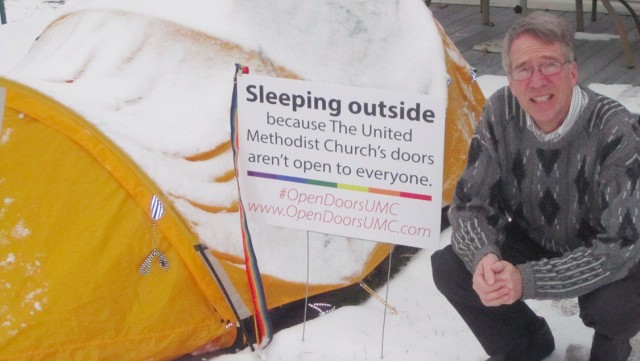
A Methodist minister has cast himself out into the cold to show his support LGBT people, vowing to sleep in a tent outside his Michigan home for 175 days to protest his church’s opposition to same-sex marriage and the ordination of LGBT members.
Rev. Michael Tupper, pastor of Parchment United Methodist Church in Parchment, Michigan, first engaged with LGBT issues six years ago when his daughter Sarah came out to him as a lesbian. But his entry into outright pro-LGBT activism began last year, when Sarah asked him to officiate her wedding to another woman she met while attending Wheaton College, a hardline conservative evangelical Christian school.

Pastors are prohibited from officiating same-sex weddings in Tupper’s denomination, the United Methodist Church (UMC), and those that do are often put on trial within the church. But Tupper did it anyway, explaining to ThinkProgress that he simply couldn’t tell his daughter no.
“I chose to do that, and complaint was filed,” he said. “All of a sudden it became so clear to me — the discrimination against LGBT people in the church.”
All of sudden it became so clear to me — the discrimination against LGBT people in the church. After he was brought up on charges by church officials for performing the same-sex union, Tupper pitched a tent outside the office of the man tasked with handling his case, hoping to dissuade him from prosecuting. When the case ultimately moved forward, Tupper returned to Parchment, where he is now vowing to sleep outside his house for 175 consecutive nights in protest — no small feat in Michigan, where snow is a constant and where temperatures often drop to frigid levels in winter.

“Most nights it gets into the 20s. It’s gotten down to 5 degrees,” he said, noting that he sleeps in a sleeping bag tucked inside another sleeping bag. “Yeah it’s cold. But I’ve managed.”
The protest, he said, is about more than his case — it’s about how the church treats LGBT people like his daughter.
“It’s to symbolize how our church — particularly the United Methodist Church — is pushing LGBT people outside,” he said. “It symbolizes how we push LGBT people out of the church and into the cold.”

Tupper is part of a growing, multi-year movement within the UMC to push for the full inclusion of LGBT people within the denomination, which currently calls the “practice” of homosexuality “incompatible with Christian teaching” in its Book of Discipline. In 2013, Methodist minister Frank Schaefer was famously defrocked for officiating the same-sex wedding of his son, only to be reinstated in 2014 on a technicality. Some progressive Methodist bishops have simply refused to take up similar cases against pastors who oversee same-sex weddings, and pro-LGBT ministers have performed LGBT unions in large groups as a form of protest. And in January, UMC minister Cynthia Meyer came out to her congregation in a sermon, telling congregants that “the Lord has led me here to share my whole truth with you.”

It’s a God thing…I’m willing to do it for my daughter.
Pro-LGBT Methodist groups such as Reconciling Ministries Network have ramped up their efforts this year, hoping to build momentum in the lead up to the UMC’s General Conference in Portland, Oregon this May, when the denomination will discuss and vote on a number of issues — including same-sex marriage. Other Mainline Christian groups such as the Presbyterian Church (U.S.A.) and the Episcopal Church have voted to embrace same-sex marriage and LGBT ordination at their denominational gatherings in the past few years, sparking hopes that the UMC — the largest Mainline denomination in the country with around 7 million members — could follow suit. Activists note that there is already widespread support in American pews (an April 2015 Public Religion Research Institute poll found that 67 percent of U.S. Methodists said they backed same-sex marriage) although there is concern that delegates from more conservative factions of the UMC’s global body could sway the vote against inclusion.
Tupper says he plans to attend the General Conference, where he will pitch his tent outside the doors to remind people of the issue.
“I’m hoping to encourage those delegates to move towards more inclusion of LGBTQ people, and for them to be ordained as pastors,” he said. “[General Conference] is the only time when we can make policy change, and change isn’t going to happen unless we take it out from under the table to help people see what our policy is doing to people.”

When asked why he is so willing to risk his personal wellbeing — not to mention his ordination — for the cause of LGBT equality, Tupper explained that it ultimately comes down to the two things that got him into the God business in the first place: faith and family.
“It’s a very small sacrifice to pay compared to the experience that my daughter and other LGBTQ people have had in the church…the rejection they’ve experienced is so much more than my little physical discomfort,” he said. “It’s a God thing…I’m willing to do it for my daughter.”
Source: thinkprogress.org







